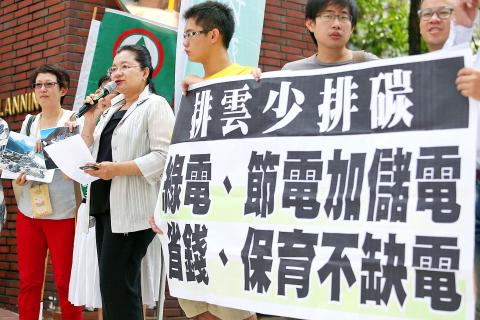Environmental groups yesterday staged a rally in front of the Construction and Planning Agency’s headquarters in Taipei to protest a proposal to construct a long-distance power line on Yushan (玉山), or Jade Mountain, the nation’s highest peak.
Making coffee with a solar-powered coffee van to show how off-grid green energy could sustain basic living needs, dozens of protesters said that the proposed power line is completely unnecessary, and the agency should not try to turn Paiyun Lodge (排雲山莊), the famed camp site at an altitude of 3,400m on Yushan, into a hotel and boost carbon emissions.
The Yushan National Park Administration has proposed a NT$200 million (US$6.1 million) project to construct an 8.5km-long power line from Tataka (塔塔加) — a saddle on Yushan in Chiayi County at an altitude of 2,610m — to the lodge to transmit commercial power to meet emergency medical needs, as well as electricity and communication demands.

Photo: CNA
Taiwan Renewable Energy Alliance managing director Kao Ju-ping (高茹萍) said that a solar facility is more suitable to mountain areas because there is sufficient radiation, and authorities should turn Yushan into a model national park to demonstrate how renewable energy could replace conventional power sources.
Taiwan Environmental Protection Union secretary-general Chen Bing-heng (陳秉亨) said a 10kW solar generator should meet the park administration’s estimated daily power consumption of 37kW, which would cost only about NT$1 million and is much cheaper than the proposed power line project.
Emergency medical devices such as oxygen concentrators and automated external defibrillators are usually equipped with rechargeable batteries and can be connected to off-grid power, nullifying the need to construct power lines on the mountain, Chen said.
Democratic Progressive Party Legislator Tien Chiu-ching (田秋堇) said that a combined solar and wind power system with a backup diesel generator should be adequate for hikers, adding that fixed power lines are costly to build and maintain, given the number of typhoons that visit the country each year.
Wild at Heart Legal Defense Association lawyer Hsieh Meng-yu (謝孟羽) said that the project cannot be approved for review without a study of the impact on public safety of development on such a geologically sensitive area.
In response, National Parks Division director Chan Te-shu (詹德樞), who accepted the protesters’ petition, said that the proposal is still in the planning stage and no budget has been allocated.
The establishment of a fixed power line is one of the three proposed projects to improve the facility on Yushan — the other two being a hydroelectric system and a combined solar-diesel power system of solar energy and diesel power — with none expected to be approved until after public hearings are conducted, Chan said.
Hikers have suggested that the agency upgrade the facility on the mountain following recent disasters, but the agency would only approve projects that garner enough public support, he said.

A preclearance service to facilitate entry for people traveling to select airports in Japan would be available from Thursday next week to Feb. 25 at Taiwan Taoyuan International Airport, Taoyuan International Airport Corp (TIAC) said on Tuesday. The service was first made available to Taiwanese travelers throughout the winter vacation of 2024 and during the Lunar New Year holiday. In addition to flights to the Japanese cities of Hakodate, Asahikawa, Akita, Sendai, Niigata, Okayama, Takamatsu, Kumamoto and Kagoshima, the service would be available to travelers to Kobe and Oita. The service can be accessed by passengers of 15 flight routes operated by

MORE FALL: An investigation into one of Xi’s key cronies, part of a broader ‘anti-corruption’ drive, indicates that he might have a deep distrust in the military, an expert said China’s latest military purge underscores systemic risks in its shift from collective leadership to sole rule under Chinese President Xi Jinping (習近平), and could disrupt its chain of command and military capabilities, a national security official said yesterday. If decisionmaking within the Chinese Communist Party has become “irrational” under one-man rule, the Taiwan Strait and the regional situation must be approached with extreme caution, given unforeseen risks, they added. The anonymous official made the remarks as China’s Central Military Commission Vice Chairman Zhang Youxia (張又俠) and Joint Staff Department Chief of Staff Liu Zhenli (劉振立) were reportedly being investigated for suspected “serious

ENHANCING EFFICIENCY: The apron can accommodate 16 airplanes overnight at Taoyuan airport while work on the third runway continues, the transport minister said A new temporary overnight parking apron at Taiwan Taoyuan International Airport is to start operating on Friday next week to boost operational efficiency while the third runway is being constructed, the Ministry of Transportation and Communications said yesterday. The apron — one of the crucial projects in the construction of the third runway — can accommodate 16 aircraft overnight at the nation’s largest international airport, Minister of Transportation and Communications Chen Shih-kai (陳世凱) told reporters while inspecting the new facility yesterday morning. Aside from providing the airport operator with greater flexibility in aircraft parking during the third runway construction,

American climber Alex Honnold is to attempt a free climb of Taipei 101 today at 9am, with traffic closures around the skyscraper. To accommodate the climb attempt and filming, the Taipei Department of Transportation said traffic controls would be enforced around the Taipei 101 area. If weather conditions delay the climb, the restrictions would be pushed back to tomorrow. Traffic controls would be in place today from 7am to 11am around the Taipei 101 area, the department said. Songzhi Road would be fully closed in both directions between Songlian Road and Xinyi Road Sec 5, it said, adding that bidirectional traffic controls would